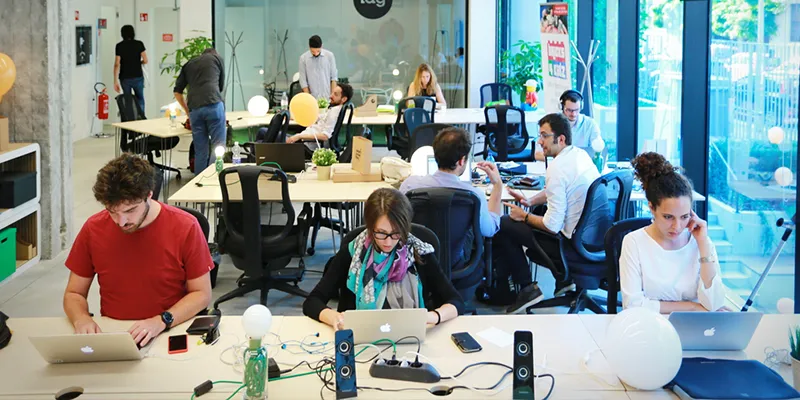COVID-19: Co-working segment hit by lockdown
Co-working segment is facing a challenging time post-lockdown, with operators getting requests for rental waivers as well as cancellation of lease agreements from their clients, especially startups, freelancers, and small enterprises.
Co-working segment, which has been growing at a rapid pace for the last few years, is facing a challenging time post-lockdown, with operators getting requests for rental waivers as well as cancellation of lease agreements from their clients, especially startups, freelancers, and small enterprises.
Entire business activities, which involve taking co-working spaces on lease from landlords and then sub-leasing it to clients, have come to a grinding halt due to the lockdown to prevent spread of COVID-19 (coronavirus), according to property consultants and co-working operators.

However, market experts expect the impact to be short-term, as demand for flexible workspaces would only rise in times of uncertainties.
Co-working operators leased 10.8 million sq. ft office space during 2019, up 26 percent from the previous year, according to property consultant CBRE.
"The impact of COVID-19 in India is likely to be short-lived providing the virus remains relatively contained. However, on the positive side, health and wellness of employees could take centre stage for the majority of the corporates with greater focus on workplace hygiene, remote working policies, and increased adoption of flexible space options," said Anshuman Magazine, Chairman & CEO - India, South East Asia, Middle East & Africa, CBRE.
co-founder and CEO Amit Ramani said, "...we are striving to maintain a fine balance between our landlords and members by passing through the waivers, which we get on fixed rental payment and our savings on variable operating costs, to our customers in the form of concessions on monthly rentals."
The company is renegotiating contracts with its partners, while assuring them to go back to original contractual terms once the current situation stabilises, he told PTI.
Ramani expects a V-shaped recovery for co-working segment once the lockdown period ends as companies would lay more emphasis on cost optimization and prefer flexible workspace.
Smartworks founder Neetish Sarda said, "As of now, we haven't received many requests for concession or payment waivers. Majority of our clients are large enterprises and business continuity is important to them."
"We do understand these are hard times and will follow the industry norms for waivers on a case to case basis," he told PTI.
Sarda said the company has noticed an increase in the number of inquiries from enterprises in the last few weeks though materialisation of deals might take longer than usual.
He said, co-working industry might see some consolidation soon, and the company will explore acquisition opportunities.
Aditya Verma, Founder of , said property leasing activity of co-working operators has indeed taken a back seat.
"We were at an advanced stage of negotiating two lease agreements in Gurugram that would have added approx 500 additional seats, but both the discussions have been put on hold for some time. The activity to sign-up members also stands suspended till the lockdown is lifted," he added.
These are challenging times not only for co-working companies but for businesses in general, Verma said.
"Fortunately for us, we achieved breakeven in November 2019, and our dependence on external capital is limited. The current situation will severely impact co-working companies that are yet to figure out a viable model to scale the business. This will also prevent new companies to enter the segment," he said.
Skootr co-founder Puneet Chandra said the sector has been hit hard because of COVID-19.
Most of the startups, SMEs, and freelancers have demanded full waiver of rentals, he said, adding that "rental waiver is one part, contracts are getting cancelled too since some companies are fighting for survival."
"Therefore, co-working operators are now coming together to exercise force majeure to cease rentals outflow to landlords," Chandra said.
He said co-working operators like Skootr, who have large corporates and MNCs as their clients, are not facing problem in managing cash flows.
Naveen Nandwani, Managing Director Commercial Advisory & Transactions, Savills India, said, "Every asset class will see an impact because of the uncertainties around the pandemic and consequent lockdown. Co-working office segment is no different."
He said enquiries for new leases have fallen.
"While large enterprise firms remain committed, we are seeing requests for rental discounts, rent waivers, and abatements by few other occupiers. Those co-working spaces occupied by startups and entrepreneurs would feel the immediate impact of the situation as they work on short term leases," Nandwani said.
Karan Singh Sodi - Regional Managing Director, Mumbai - JLL India, said, "It is still early days to assess the impact of COVID-19 on the leasing activity of co-working operators. However, most players who were in active discussions with landlords for leasing premises prior to lockdown, have not pulled away from such discussions."
When asked how coworking players would manage cash flows, he said most operators having existing facilities are operating at approximately 65-70 percent capacity, thereby helping with healthy cash flow management.
"As of now, there isn't a trend of clients asking for rental waivers. In fact, we are witnessing increased levels of inquiries from clients especially from a Business Continuity' perspective," Sodi said.
Most corporates would avoid capital expenditures and look to co-working facilities to expand their business, he added.
Prashant Garg, Country Manager, Garage Society, India, said, "Industries across the globe have been impacted including commercial real estate."
"This, however, might just be the advent of a new way of working where people will develop alternate styles of working other than having a traditional office set up," he said.
(Edited by Megha Reddy)








